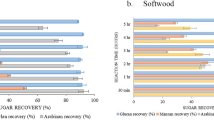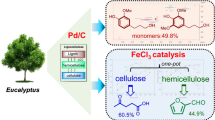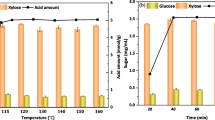Abstract
Softwood is an abundantly available lignocelloluse feedstock which can be converted into chemical and liquid fuels via sugar-based platform molecules. However, cost-effective release of pyrolytic sugars from softwood is considerably hindered by the biomass recalcitrance related to its compositions and structures as well as the catalytic effect of alkali and alkaline earth metals. In order to address these challenges, a novel biorefinery based on H2SO4 assisted organosolvolysis of softwood (e.g. pine wood) in high boiling organic solvents coupled with subsequent fast pyrolysis is proposed. The experimental results demonstrated that H2SO4 assisted organosolvolysis could effectively deconstruct pine wood into pentose, organosolv lignin, cellulose-rich fraction, and simutaneously transfer alkali and alkaline earth metals to solutions, thus improving the yields of platform chemcials (levoglucosan and phenols) in subsequent fast pyrolysis. Moreover, different high boiling solvents showed obviously distinct performance for the deconstruction of pine wood and removal of alkali and alkaline earth metals, thus resulting in different yields of platform chemcials in the subsequent fast pyrolysis. The rank order of these solvents which are beneficial for improving the yield of pyrolytic sugars from pine wood was ethylene glycol > glycerin + ethylene glycol (mass ratio of 1:1) > glycerin > γ-valerolactone. The yield of levoglucosan increased drastically from 3.53 wt% of raw pine wood to 27.19 wt% of cellulose-rich fraction pretreated by ethylene glycol with 1 wt% H2SO4. It was found that the yield of levoglucosan from fast pyrolysis of feedstocks was subjecetd to the mutual effect of normalized total alkali and alkaline earth metals’ valencies and severity of delignification. These findings help to provide a simple and efficient process to selective production of platform chemicals from highly recalcitrant biomass.









Similar content being viewed by others
References
Atienza-Martinez M, Fonts I, Lazaro L, Ceamanos J, Gea G (2015) Fast pyrolysis of torrefied sewage sludge in a fluidized bed reactor. Chem Eng J 259:467–480. https://doi.org/10.1016/j.cej.2014.08.004
Boeriu CG, Bravo D, Gosselink RJA, van Dam JEG (2004) Characterisation of structure-dependent functional properties of lignin with infrared spectroscopy Ind Crop. Prod 20:205–218. https://doi.org/10.1016/j.indcrop.2004.04.022
Bridgwater AV (2003) Renewable fuels and chemicals by thermal processing of biomass. Chem Eng J 91:87–102. https://doi.org/10.1016/S1385-8947(02)00142-0
Casas A, Alonso MV, Oliet M, Rojo E, Rodriguez F (2012) FTIR analysis of lignin regenerated from Pinus radiata and Eucalyptus globulus woods dissolved in imidazolium-based ionic liquids. J Chem Technol Biot 87:472–480. https://doi.org/10.1002/jctb.2724
Chen HM, Zhao J, Hu TH, Zhao XB, Liu DH (2015) A comparison of several organosolv pretreatments for improving the enzymatic hydrolysis of wheat straw: substrate digestibility, fermentability and structural features. Appl Energy 150:224–232. https://doi.org/10.1016/j.apenergy.2015.04.030
DeMartini JD, Pattathil S, Miller JS, Li HJ, Hahn MG, Wyman CE (2013) Investigating plant cell wall components that affect biomass recalcitrance in poplar and switchgrass Energ. Environ Sci 6:898–909. https://doi.org/10.1039/c3ee23801f
Faix O (1991) Classification of lignins from different botanical origins by FT-IR spectroscopy. Holzforschung 45:21–27. https://doi.org/10.1515/hfsg.1991.45.s1.21
Fan YY, Zhang DY, Zheng AQ, Zhao ZL, Li HB, Yang TH (2019) Selective production of anhydrosugars and furfural from fast pyrolysis of corncobs using sulfuric acid as an inhibitor and catalyst. Chem Eng J 358:743–751. https://doi.org/10.1016/j.cej.2018.10.014
French ADJC (2014) Idealized powder diffraction patterns for cellulose polymorphs 21:885–896
Garcia-Perez M et al (2008) Fast pyrolysis of oil mallee woody biomass: effect of temperature on the yield and quality of pyrolysis products. Ind Eng Chem Res 47:1846–1854. https://doi.org/10.1021/ie071497p
Ghasemi M, Tsianou M, Alexandridis P (2018) Population ensemble modeling of biomass dissolution. Chem Eng J 350:37–48. https://doi.org/10.1016/j.cej.2018.05.167
Gschwend FJV, Chambon CL, Biedka M, Brandt-Talbot A, Fennell PS, Hallett JP (2019) Quantitative glucose release from softwood after pretreatment with low-cost ionic liquids. Green Chem 21:692–703. https://doi.org/10.1039/c8gc02155d
Hassan E, Abou-Yousef H, Steele P (2013) Increasing the efficiency of fast pyrolysis process through sugar yield maximization and separation from aqueous fraction bio-oil. Fuel Process Technol 110:65–72. https://doi.org/10.1016/j.fuproc.2012.11.003
Himmel ME (2007) Biomass recalcitrance: engineering plants and enzymes for biofuels production (vol 315, pg 804, 2007). Science 316:982
Himmel ME, Ding SY, Johnson DK, Adney WS, Nimlos MR, Brady JW, Foust TD (2007) Biomass recalcitrance: engineering plants and enzymes for biofuels production. Science 315:804–807. https://doi.org/10.1126/science.1137016
Hoekstra E, Van Swaaij WPM, Kersten SRA, Hogendoorn KJA (2012a) Fast pyrolysis in a novel wire-mesh reactor: decomposition of pine wood and model compounds. Chem Eng J 187:172–184. https://doi.org/10.1016/j.cej.2012.01.118
Hoekstra E, van Swaaij WPM, Kersten SRA, Hogendoorn KJA (2012b) Fast pyrolysis in a novel wire-mesh reactor: design and initial results. Chem Eng J 191:45–58. https://doi.org/10.1016/j.cej.2012.01.117
Hosoya T, Sakaki S (2013) Levoglucosan formation from crystalline cellulose: importance of a hydrogen bonding network in the reaction. Chemsuschem 6:2356–2368. https://doi.org/10.1002/cssc.201300338
Jiang LQ, Zheng AQ, Zhao ZL, He F, Li HB, Liu WG (2015) Obtaining fermentable sugars by dilute acid hydrolysis of hemicellulose and fast pyrolysis of cellulose. Bioresource Technol 182:364–367. https://doi.org/10.1016/j.biortech.2015.01.032
Jiang LQ, Fang Z, Zhao ZL, Zheng AQ, Wang XB, Li HB (2019) Levoglucosan and its hydrolysates via fast pyrolysis of lignocellulose for microbial biofuels: a state-of-the-art review. Renew Sust Energy Rev 105:215–229. https://doi.org/10.1016/j.rser.2019.01.055
Kan T, Strezov V, Evans TJ (2016) Lignocellulosic biomass pyrolysis: a review of product properties and effects of pyrolysis parameters. Renew Sustain Energy Rev 57:1126–1140. https://doi.org/10.1016/j.rser.2015.12.185
Kubo S, Kadla JF (2005) Hydrogen bonding in lignin: a Fourier transform infrared model compound study. Biomacromolecules 6:2815–2821. https://doi.org/10.1021/bm050288q
Lee JM, Jameel H, Venditti RA (2010) A comparison of the autohydrolysis and ammonia fiber explosion (AFEX) pretreatments on the subsequent enzymatic hydrolysis of coastal Bermuda grass. Bioresource Technol 101:5449–5458. https://doi.org/10.1016/j.biortech.2010.02.055
Li M, Tu MB, Cao DX, Bass P, Adhikari S (2013) Distinct roles of residual xylan and lignin in limiting enzymatic hydrolysis of organosolv pretreated loblolly pine and sweetgum. J Agric Food Chem 61:646–654. https://doi.org/10.1021/jf304517w
Lian JN, Chen SL, Zhou SA, Wang ZH, O’Fallon J, Li CZ, Garcia-Perez M (2010) Separation, hydrolysis and fermentation of pyrolytic sugars to produce ethanol and lipids. Bioresource Technol 101:9688–9699. https://doi.org/10.1016/j.biortech.2010.07.071
Linde M, Jakobsson E, Galbe M, Zacchi G (2008) Steam pretreatment of dilute H2SO4-impregnated wheat straw and SSF with low yeast and enzyme loadings for bioethanol production. Biomass Bioenergy 32:326–332. https://doi.org/10.1016/j.biombioe.2007.09.013
Liu JA, Takada R, Karita S, Watanabe T, Honda Y, Watanabe T (2010) Microwave-assisted pretreatment of recalcitrant softwood in aqueous glycerol. Bioresource Technol 101:9355–9360. https://doi.org/10.1016/j.biortech.2010.07.023
Lu Q, Li WZ, Zhu XF (2009) Overview of fuel properties of biomass fast pyrolysis oils. Energy Convers Manag 50:1376–1383. https://doi.org/10.1016/j.enconman.2009.01.001
Mahadevan R, Adhikari S, Shakya R, Wang K, Dayton D, Lehrich M, Taylor SE (2016) Effect of alkali and alkaline earth metals on in-situ catalytic fast pyrolysis of lignocellulosic biomass: a microreactor study. Energy Fuel 30:3045–3056. https://doi.org/10.1021/acs.energyfuels.5b02984
Maqbool W, Hobson P, Dunn K, Doherty W (2017) Supercritical carbon dioxide separation of carboxylic acids and phenolics from bio-oil of lignocellulosic origin: understanding bio-oil compositions, compound solubilities, and their fractionation. Ind Eng Chem Res 56:3129–3144. https://doi.org/10.1021/acs.iecr.6b04111
Mcdonough TJ (1993) The chemistry of organosolv delignification. Tappi J 76:186–193
Pandey KK, Pitman AJ (2003) FTIR studies of the changes in wood chemistry following decay by brown-rot and white-rot fungi. Int Biodeter Biodegr 52:151–160. https://doi.org/10.1016/S0964-8305(03)00052-0
Patwardhan PR, Satrio JA, Brown RC, Shanks BH (2010) Influence of inorganic salts on the primary pyrolysis products of cellulose. Bioresour Technol 101:4646–4655. https://doi.org/10.1016/j.biortech.2010.01.112
Poletto M, Zattera AJ, Forte MMC, Santana RMC (2012) Thermal decomposition of wood: influence of wood components and cellulose crystallite size. Bioresource Technol 109:148–153. https://doi.org/10.1016/j.biortech.2011.11.122
Segal L, Creely JJ, Martin AE, Conrad CM (1959) An empirical method for estimating the degree of crystallinity of native cellulose using the X-ray diffractometer. Text Res J 29:786–794. https://doi.org/10.1177/004051755902901003
Sharma RK, Wooten JB, Baliga VL, Lin XH, Chan WG, Hajaligol MR (2004) Characterization of chars from pyrolysis of lignin. Fuel 83:1469–1482. https://doi.org/10.1016/j.fuel.2003.11.015
Shen D, Jin W, Hu J, Xiao R, Luo K (2015) An overview on fast pyrolysis of the main constituents in lignocellulosic biomass to valued-added chemicals: structures, pathways and interactions. Renew Sustain Energy Rev 51:761–774. https://doi.org/10.1016/j.rser.2015.06.054
Smit A, Huijgen W (2017) Effective fractionation of lignocellulose in herbaceous biomass and hardwood using a mild acetone organosolv process. Green Chem 19:5505–5514. https://doi.org/10.1039/c7gc02379k
Wang SR, Guo XJ, Wang KG, Luo ZY (2011) Influence of the interaction of components on the pyrolysis behavior of biomass. Anal Appl Pyrol 91:183–189. https://doi.org/10.1016/j.jaap.2011.02.006
Wang SR, Wang YR, Cai QJ, Wang XY, Jin H, Luo ZY (2014) Multi-step separation of monophenols and pyrolytic lignins from the water-insoluble phase of bio-oil. Sep Purif Technol 122:248–255. https://doi.org/10.1016/j.seppur.2013.11.017
Wang S, Dai G, Yang H, Luo Z (2017) Lignocellulosic biomass pyrolysis mechanism: a state-of-the-art review. Prog Energy Combust Sci 62:33–86. https://doi.org/10.1016/j.pecs.2017.05.004
Wu SL, Shen DK, Hu J, Zhang HY, Xiao R (2016) Cellulose-lignin interactions during fast pyrolysis with different temperatures and mixing methods. Biomass Bioenerg 90:209–217. https://doi.org/10.1016/j.biombioe.2016.04.012
Yildiz G, Ronsse F, Venderbosch R, van Duren R, Kersten SRA, Prins W (2015) Effect of biomass ash in catalytic fast pyrolysis of pine wood. Appl Catal B-Environ 168:203–211. https://doi.org/10.1016/j.apcatb.2014.12.044
Yu Y, Liu DW, Wu HW (2014) Formation and characteristics of reaction intermediates from the fast pyrolysis of NaCl- and MgCl2-loaded celluloses. Energy Fuel 28:245–253. https://doi.org/10.1021/ef401483u
Zhang J, Choi YS, Yoo CG, Kim TH, Brown RC, Shanks BH (2015) Cellulose–hemicellulose and cellulose-lignin interactions during fast pyrolysis. ACS Sustain Chem Eng 3:293–301. https://doi.org/10.1021/sc500664h
Zhang K, Pei ZJ, Wang DH (2016) Organic solvent pretreatment of lignocellulosic biomass for biofuels and biochemicals: a review. Bioresource Technol 199:21–33. https://doi.org/10.1016/j.biortech.2015.08.102
Zhao XB, Liu DH (2012) Fractionating pretreatment of sugarcane bagasse by aqueous formic acid with direct recycle of spent liquor to increase cellulose digestibility-the Formiline process. Bioresource Technol 117:25–32. https://doi.org/10.1016/j.biortech.2012.04.062
Zhao XB, Cheng KK, Liu DH (2009) Organosolv pretreatment of lignocellulosic biomass for enzymatic hydrolysis. Appl Microbiol Biot 82:815–827. https://doi.org/10.1007/s00253-009-1883-1
Zhao XB, Zhang LH, Liu DH (2012a) Biomass recalcitrance. Part I: the chemical compositions and physical structures affecting the enzymatic hydrolysis of lignocellulose. Biofuel Bioprod Bior 6:465–482. https://doi.org/10.1002/bbb.1331
Zhao XB, Zhang LH, Liu DH (2012b) Biomass recalcitrance. Part II: Fundamentals of different pre-treatments to increase the enzymatic digestibility of lignocellulose. Biofuel Bioprod Bior 6:561–579. https://doi.org/10.1002/bbb.1350
Zheng AQ et al (2015) Overcoming biomass recalcitrance for enhancing sugar production from fast pyrolysis of biomass by microwave pretreatment in glycerol. Green Chem 17:1167–1175. https://doi.org/10.1039/c4gc01724b
Zheng AQ et al (2016a) Effect of hydrothermal treatment on chemical structure and pyrolysis behavior of eucalyptus wood. Energy Fuels 30:3057–3065. https://doi.org/10.1021/acs.energyfuels.5b03005
Zheng AQ et al (2016b) Bridging the gap between pyrolysis and fermentation: improving anhydrosugar production from fast pyrolysis of agriculture and forest residues by microwave-assisted organosolv pretreatment. ACS Sustain Chem Eng 4:5033–5040. https://doi.org/10.1021/acssuschemeng.6b01416
Zheng AQ et al (2017) Toward fast pyrolysis-based biorefinery: selective production of platform chemicals from biomass by organosolv fractionation coupled with fast pyrolysis. ACS Sustain Chem Eng 5:6507–6516. https://doi.org/10.1021/acssuschemeng.7b00622
Zheng AQ et al (2018) Effect of microwave-assisted organosolv fractionation on the chemical structure and decoupling pyrolysis behaviors of waste biomass. J Anal Appl Pyrol 131:120–127. https://doi.org/10.1016/j.jaap.2018.02.016
Zhou ZY, Lei FH, Li PF, Jiang JX (2018) Lignocellulosic biomass to biofuels and biochemicals: a comprehensive review with a focus on ethanol organosolv pretreatment technology. Biotechnol Bioeng 115:2683–2702. https://doi.org/10.1002/bit.26788
Acknowledgments
The authors acknowledge the National Natural Science Foundation of China (Grants 51876208, 51776209, 51606204), Major International (Regional) Joint Research Project of the National Science Foundation of China (Grant 51661145011), National Key R&D Program of China (Grant 2017YFE0124200), Science and Technology Planning Project of Guangdong Province, China (Grants 2014B020216004, 2015A020215024), Youth Innovation Promotion Association, CAS (2018383), and Pearl River S&T Nova Program of Guangzhou (Grant 201806010061) for their financial supports of this work. We would also like to express our sincere gratitude to the staffs from analysis and testing center attached to Guangzhou Institute of Energy Conversion for their assistance in characterization and testing.
Author information
Authors and Affiliations
Corresponding authors
Additional information
Publisher's Note
Springer Nature remains neutral with regard to jurisdictional claims in published maps and institutional affiliations.
Rights and permissions
About this article
Cite this article
Yang, X., Zheng, A., Zhao, Z. et al. Overcoming biomass recalcitrance to enhance platform chemical production from soft wood by organosolvolysis coupled with fast pyrolysis. Cellulose 26, 9687–9708 (2019). https://doi.org/10.1007/s10570-019-02757-7
Received:
Accepted:
Published:
Issue Date:
DOI: https://doi.org/10.1007/s10570-019-02757-7




